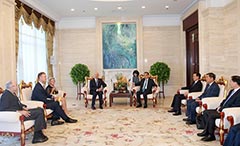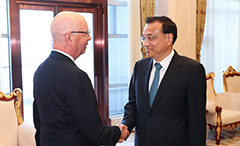Summer Davos to help address global economic challenges: says expert
2017-06-27
China Daily
David Aikman, chief representative officer for China at the World Economic Forum, believes Summer Davos will help address the challenges facing the global economy. He spoke to China Daily reporter Zheng Xin about how the Belt and Road Initiative has become a new model for international cooperation, and why globalization remains the best way to lift people out of poverty.
How will the summer meeting, which will highlight the idea of innovation and sustainability, help address the global challenges?
The World Economic Forum meeting will be seeking to take forward two of the most critical agenda items — the need for more inclusive growth strategies and a clearly defined response to the huge wave of disruption that we are about to see as a result of unprecedented technological innovation.
Our program will support these efforts with major sessions on all the global challenges. For example, we will be looking at the implications of the United States’ decision to withdraw from the Paris Climate Agreement, and how to boost global productivity, global trade and inclusive growth.
Like the sharing economy, China is already a leader in this emerging sector. At the meeting, we will take forward collaboration with the China Council for International Cooperation on Environment and Development to produce policies and practices that lead to greater resource-efficiency.
The Belt and Road Initiative focuses on mutual responsibility and shared goals beyond borders. Can this serve as a model for other regions?
The Belt and Road Initiative is a new model for international cooperation at a time when the world clearly needs to find ways of fostering common approaches to shared interests.
This initiative stands out because it is based on a multi-stakeholder approach, which is conducive to dialogue and cooperation.
It leverages market forces, as well as social inclusion. It is based on an open platform, which allows for greater dynamism and innovation. It represents a positive message and helps prepare economies for the Fourth Industrial Revolution.
What is the future of globalization and globalized trade?
Globalization remains one of the most promising paths toward lifting the world’s poorest out of poverty. A new consensus needs to be built around improving the trade and investment frameworks that underpin our model of globalization. Key to this discussion will be gaining acceptance for more inclusive models of growth and helping prepare economies for the disruption that will be wrought by the onset of the Fourth Industrial Revolution.
No one industry or supply chain will be unaffected by this. While this great transformation brings great possibility for emerging nations to leapfrog more developed international partners, it also has the potential to bring great economic and societal upheaval.
Will China’s Made in China 2025 strategy lead the world’s second largest economy to a different development model?
China is clearly making huge strides toward building resilience in its manufacturing sector. Two of its companies — ZTE and Huawei — have filed more international patents than any other organization. And in 2016, production of industrial robots was the fastest growing part of the manufacturing sector.
But for China to succeed in the Fourth Industrial Revolution, Made in China needs to be about more than manufacturing. It needs to be about building leadership in pioneering new business models.
We already see China-grown success stories, such as WeChat, which is commercializing social media in ways we are not seeing elsewhere. Likewise, bike sharing is a Made in China innovation that the rest of the world is now catching on to.


